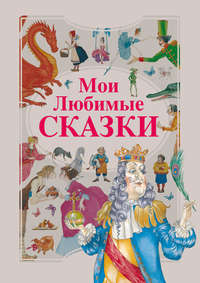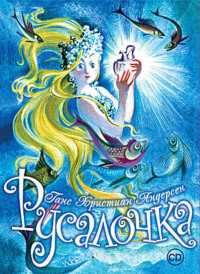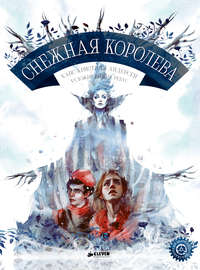 полная версия
полная версияA Christmas Greeting: A Series of Stories
Thousands of lights were burning on the green branches, and gaily-colored pictures, such as she had seen in the shop-windows looked down upon her. The little maiden stretched out her hands towards them when – the match went out. The lights of the Christmas tree rose higher and higher, she saw them now as stars in heaven; one fell down and formed a long trail of fire.
"Some one is just dead!" said the little girl; for her old grandmother, the only person who had loved her, and who was now no more, had told her, that when a star falls, a soul ascends to God.
She drew another match against the wall: it was again light, and in the lustre there stood the old grandmother, so bright and radiant, so mild, and with such an expression of love.
"Grandmother!" cried the little one; "oh, take me with you! You go away when the match burns out; you vanish like the warm stove, like the delicious roast goose, and like the magnificent Christmas tree!" And she rubbed the whole bundle of matches quickly against the wall, for she wanted to be quite sure of keeping her grandmother near her. And the matches gave such a brilliant light that it was brighter than at noon-day: never formerly had the grandmother been so beautiful and so tall. She took the little maiden, on her arm, and both flew in brightness and in joy so high, so very high, and then above was neither cold, nor hunger, nor anxiety – they were with God.
But in the corner, at the cold hour of dawn, sat the poor girl, with rosy cheeks and with a smiling mouth, leaning against the wall – frozen to death on the last evening of the old year. Stiff and stark sat the child there with her matches, of which one bundle had been burnt. "She wanted to warm herself," people said: no one had the slightest suspicion of what beautiful things she had seen; no one even dreamed of the splendor in which, with her grandmother she had entered on the joys of a new year.
THE RED SHOES
There was once a little girl who was very pretty and delicate, but in summer she was forced to run about with bare feet, she was so poor, and in winter wear very large wooden shoes, which made her little insteps quite red, and that looked so dangerous!
In the middle of the village lived old Dame Shoemaker; she sate and sewed together, as well as she could, a little pair of shoes out of old red strips of cloth; they were very clumsy, but it was a kind thought. They were meant for the little girl. The little girl was called Karen.
On the very day her mother was buried, Karen received the red shoes, and wore them for the first time. They were certainly not intended for mourning, but she had no others, and with stockingless feet she followed the poor straw coffin in them.
Suddenly a large old carriage drove up and a large old lady sate in it: she looked at the little girl, felt compassion for her, and then said to the clergyman:
"Here, give me the little girl, I will adopt her!"
And Karen believed all this happened on account of the red shoes, but the old lady thought they were horrible, and they were burnt. But Karen herself was cleanly and nicely dressed; she must learn to read and sew; and people said she was a nice little thing, but the looking-glass said: "Thou art more than nice, thou art beautiful!"
Now the queen once traveled through the land, and she had her little daughter with her. And this little daughter was a princess, and people streamed to the castle, and Karen was there also, and the little princess stood in her fine white dress, in a window, and let herself be stared at; she had neither a train nor a golden crown, but splendid red morocco shoes. They were certainly far handsomer than those Dame Shoemaker had made for little Karen. Nothing in the world can be compared with red shoes.
Now Karen was old enough to be confirmed; she had new clothes and was to have new shoes also. The rich shoemaker in the city took the measure of her little foot. This took place at his house, in his room; where stood large glass-cases, filled with elegant shoes and brilliant boots. All this looked charming, but the old lady could not see well, and so had no pleasure in them. In the midst of the shoes stood a pair of red ones, just like those the princess had worn. How beautiful they were! The shoemaker said also they had been made for the child of a count, but had not fitted.
"That must be patent leather!" said the old lady, "they shine so!'"
"Yes, they shine!" said Karen, and they fitted, and were bought, but the old lady knew nothing about their being red, else she would never have allowed Karen to have gone in red shoes to be confirmed. Yet such was the case.
Everybody looked at her feet; and when she stepped through the chancel door on the church pavement, it seemed to her as if the old figures on the tombs, those portraits of old preachers and preachers' wives, with stiff ruffs, and long black dresses, fixed their eyes on her red shoes. And she thought only of them as the clergyman laid his hand upon her head, and spoke of the holy baptism, of the covenant with God, and how she should be now a matured Christian; and the organ pealed so solemnly; the sweet children's voices sang, and the old music-directors sang, but Karen only thought of her red shoes.
In the afternoon, the old lady heard from every one that the shoes had been red, and she said that it was very wrong of Karen, that it was not at all becoming, and that in future Karen should only go in black shoes to church, even when she should be older.
The next Sunday there was the sacrament, and Karen looked at the black shoes, looked at the red ones – looked at them again, and put on the red shoes.
The sun shone gloriously; Karen and the old lady walked along the path through the corn; it was rather dusty there.
At the church door stood an old soldier with a crutch, and with a wonderfully long beard, which was more red than white, and he bowed to the ground, and asked the old lady whether he might dust her shoes. And Karen stretched out her little foot.
"See! what beautiful dancing-shoes!" said the soldier, "sit firm when you dance;" and he put his hand out towards the soles.
And the old lady gave the old soldier an alms, and went into the church with Karen.
And all the people in the church looked at Karen's red shoes, and all the pictures, and as Karen knelt before the altar, and raised the cup to her lips, she only thought of the red shoes, and they seemed to swim in it; and she forgot to sing her psalm, and she forgot to pray, "Our father in Heaven!"
Now all the people went out of church, and the old lady got into her carriage. Karen raised her foot to get in after her, when the old soldier said,
"Look, what beautiful dancing shoes!"
And Karen could not help dancing a step or two, and when she began her feet continued to dance; it was just as though the shoes had power over them. She danced round the church corner, she could not leave off; the coachman was obliged to run after and catch hold of her, and he lifted her in the carriage, but her feet continued to dance so that she trod on the old lady dreadfully. At length she took the shoes off, and then her legs had peace.
The shoes were placed in a closet at home, but Karen could not avoid looking at them.
Now the old lady was sick, and it was said she could not recover? She must be nursed and waited upon, and there was no one whose duty it was so much as Karen's. But there was a great ball in the city, to which Karen was invited. She looked, at the old lady, who could not recover, she looked at the red shoes, and she thought there could be no sin in it; – she put on the red shoes, she might do that also, she thought. But then she went to the ball and began to dance.
When she wanted to dance to the right, the shoes would dance to the left, and when she wanted to dance up the room, the shoes danced back again, down the steps, into the street, and out of the city gate. She danced, and was forced to dance straight out into the gloomy wood.
Then it was suddenly light up among the trees, and she fancied it must be the moon, for there was a face; but it was the old soldier with the red beard; he sate there, nodded his head, and said, "Look, what beautiful dancing shoes!"
Then she was terrified, and wanted to fling off the red shoes, but they clung fast; and she pulled down her stockings, but the shoes seemed to have grown to her feet. And she danced, and must dance, over fields and meadows, in rain and sunshine, by night and day; but at night it was the most fearful.
She danced over the churchyard, but the dead did not dance, – they had something better to do than to dance. She wished to seat herself on a poor man's grave, where the bitter tansy grew; but for her there was neither peace nor rest; and when she danced towards the open church door, she saw an angel standing there. He wore long, white garments; he had wings which reached from his shoulders to the earth; his countenance was severe and grave; and in his hand he held a sword, broad and glittering.
"Dance shalt thou!" said he, – "dance in thy red shoes till thou art pale and cold! Till thy skin shrivels up and thou art a skeleton! Dance shalt thou from door to door, and where proud, vain children dwell, thou shalt knock, that they may hear thee and tremble! Dance shalt thou – !"
"Mercy!" cried Karen. But she did not hear the angel's reply, for the shoes carried her through the gate into the fields, across roads and bridges, and she must keep ever dancing.
One morning she danced past a door which she well knew. Within sounded a psalm; a coffin, decked with flowers, was borne forth. Then she knew that the old lady was dead, and felt that she was abandoned by all, and condemned by the angel of God.
She danced, and she was forced to dance through the gloomy night. The shoes carried her over stack and stone; she was torn till she bled; she danced over the heath till she came to a little house. Here, she knew, dwelt the executioner; and she tapped with her fingers at the window, and said, "Come out! come out! I cannot come in, for I am forced to dance!"
And the executioner said, "Thou dost not know who I am, I fancy? I strike bad people's heads off; and I hear that my axe rings!"
"Don't strike my head off!" said Karen, "then I can't repent of my sins! But strike off my feet in the red shoes!"
And then she confessed her entire sin, and the executioner struck off her feet with the red shoes, but the shoes danced away with the little feet across the field into the deep wood.
And he carved out little wooden feet for her, and crutches, taught her the psalm criminals always sing; and she kissed the hand which had wielded the axe, and went over the heath.
"Now I have suffered enough for the red shoes!" said she; "now I will go into the church that people may see me!" And she hastened towards the church door: but when she was near it, the red shoes danced before her, and she was terrified, and turned round. The whole week she was unhappy, and wept many bitter tears; but when Sunday returned, she said, "Well, now I have suffered and struggled enough! I really believe I am as good as many a one who sits in the church, and holds her head so high!"
And away she went boldly; but she had not got farther than the churchyard gate before she saw the red shoes dancing before her; and she was frightened, and turned back, and repented of her sin from her heart.
And she went to the parsonage, and begged that they would take her into service; she would be very industrious, she said, and would do everything she could; she did not care about the wages, only she wished to have a home, and be with good people. And the clergyman's wife was sorry for her and took her into service; and she was industrious and thoughtful. She sate still and listened when the clergyman read the Bible in the evenings. All the children thought a deal of her; but when they spoke of dress, and grandeur, and beauty, she shook her head.
The following Sunday, when the family was going to church, they asked her whether she would not go with them; but she glanced sorrowfully, with tears in her eyes, at her crutches. The family went to hear the word of God; but she went alone into her little chamber; there was only room for a bed and chair to stand in it; and here she sate down with her prayer-book; and whilst she read with a pious mind, the wind bore the strains of the organ towards her, and she raised her tearful countenance, and said, "O God, help me!"
And the sun shone so clearly! and straight before her stood the angel of God in white garments, the same she had seen that night at the church door; but he no longer carried the sharp sword, but in its stead a splendid green spray, full of roses. And he touched the ceiling with the spray, and the ceiling rose so high, and where he had touched it there gleamed a golden star. And he touched the walls, and they widened out, and she saw the organ which was playing; she saw the old pictures of the preachers and the preachers' wives. The congregation sat in cushioned seats, and sang out of their prayer-books. For the church itself had come to the poor girl in her narrow chamber, or else she had come into the church. She sate in the pew with the clergyman's family, and when they had ended the psalm and looked up, they nodded and said, "It is right that thou art come!"
"It was through mercy!" she said.
And the organ pealed, and the children's voices in the choir sounded so sweet and soft! The clear sunshine streamed so warmly through the window into the pew where Karen sate! Her heart was so full of sunshine, peace, and joy, that it broke. Her soul flew on the sunshine to God, and there no one asked after the Red Shoes.
TO THE YOUNG READERS
Here is another volume of Andersen's charming stories for you; and I am sure you will be glad to get it. For my part, I am always delighted to find one that I do not happen to have yet seen; and as I know the others pleased you – for I have heard so, both directly and indirectly, from a great many people, there can be no doubt that you all will be overjoyed to have a few more of these stories told you.
And there is no one who participates in this delight more than – whom do you think? Why, than Andersen himself! He is so happy that his Tales have been thus joyfully received, and that they have found their way to the hearts and sympathies of you all. He speaks of it with evident pleasure; and it is not vanity, but his kind affectionate nature, which inclines him to mention such little occurrences as prove how firm a hold his writings have taken on the minds of the young and gentle-natured. "So much praise might," he says, "spoil a man, and make him vain. Yet no, it does not spoil him: on the contrary, it makes him better; it purifies his thoughts, and this must give one the impulse and the will to deserve it all." He was so pleased to hear, and I, you may be sure, was equally pleased to tell him, what had been written to me by a friend a short time before – that several little boys and girls, Miss Edgeworth's nephews and nieces were so delighted with the "Tales From Denmark," that they not only read and re-read them continually, but used to act the stories together in their play-hours!
And a certain little dark-eyed thing of my acquaintance, "little Nelly," or "the little gipsey," as I sometimes call her, knows the whole story of "Ellie and the Pretty Swallow," by heart; and another "wee thing," that cannot yet read, but is always wanting to have stories told her, knows all about Kay and Gerda, and the flower-garden, and how Gerda went to look for her brother, inquiring of every body she met, and how at last the good sister found him.
In Copenhegan, as Andersen himself told me, all the children know him. "And," he said, with such a countenance that showed such homage was dearer to him than the more splendid honors paid as tributes to his genius, "as I walk along the street, the little darlings nod and kiss their hands to me; and they say to one another, 'There's Andersen!' and then some more run and wave their hands. Oh yes, they all know me. But sometimes, if there be one who does not, then, perhaps, his mamma will say, 'Look, that is he who wrote the story you read the other day, and that you liked so much;' and so we soon get acquainted." And this popularity delights him more than anything; and you surely cannot call it vanity.
In the account he has written of his life, he relates a circumstance that happened to him at Dresden; and it is so pretty that I insert it here. He writes: "An evening that for me was particularly interesting I spent with the royal family, who received me most graciously. Here reigned the same quiet that is found in private life in a happy family. A whole troop of amiable children, all belonging to Prince John, were present. The youngest of the princesses, a little girl who knew that I had written the story of 'The Fir-tree,' began familiarly her conversation with me in these words: 'Last Christmas we also had a fir-tree, and it stood here in this very room.' Afterwards, when she was taken to bed earlier than the others, and had wished her parents and the king and queen 'Good night,' she turned round once more at the half-closed door, and nodded to me in a friendly manner, and as though we were old acquaintance. I was her prince of the fairy tale."
But it is not the praise of the great, or the admiration of a court, on which he sets most value, as you will see by the following extract from a letter which I received from him to-day, only an hour or two ago. It is about his stay in England, and his visit to the north, after I had left him, and I am sure he will not mind my sharing thus much of what he writes to me with you. "The hearty welcome I met with in Scotland moved me greatly. My writings were so well known, I found so many friends, that I can hardly take in so much happiness. But I must relate you one instance: in Edinburgh I went with a party of friends to Heriot's Hospital, where orphan children are taken care of and educated. We were all obliged to inscribe our names in the visitors' book. The porter read the names, and asked if that was Andersen the author: and when some one answered 'Yes,' the old man folded his hands and gazed quite in ecstacy at an old gentleman who was with us, and said: 'Yes, yes! he is just as I had always fancied him to myself – the venerable white hair – the mild expression – yes, that is Andersen!' They then explained to him that I was the person. 'That young man!' he exclaimed; 'Why generally such people, when one hears about them, are either dead or very old.' When the story was told me, I at first thought it was a joke; but the porter came up to me in a most touching manner, and told me how he and all the boys entered so entirely and heartily into my stories. It so affected me that I almost shed tears."
This is indeed popularity!
Now I dare say you thought that the little princes and princesses in a king's palace had tastes and feelings very different from a poor charity-boy; but you see, although so different in rank, they were alike in one thing – they were both children; and childhood, if left to itself, is in all situations the same.
And do you know, too, my little friends, that you are very excellent critics? Yes, most sage and excellent critics; though I dare say not one of you even ever dreamt of such a thing. But it is, nevertheless, true; and not some, but all of you, whether in England, Scotland, or Ireland – the little boys in Heriot's Hospital, and the little princess at Dresden who knew the story of "The Fir-Tree." For without one dissentient voice you have passed favorable judgment on these stories: in your estimation of them your were unanimous.
Yet when they first appeared in Denmark some of the critics by profession found fault with them, and wondered, as they said, how an author who had written works of greater pretension, could think of making his appearance with something so childish as these tales. And some kind friends, grown-up people, whose opinion was not unimportant, advised him by all means to give up writing such stories as he had no talent for them; and it was only later, that, to use Andersen's own words, "every door and heart in Denmark was open to them." But all of you, not critics by profession, you welcomed them at once; as soon as you saw them you perceived their beauty – you cherished and gave them a place in your heart. And this is the reason why I say that you are sage and excellent critics; and if you can preserve the same simple-heartedness, finding pleasure in what is natural and truthful, and allow yourselves to be guided by the instincts of your pure uncorrupted nature, you may always be so.
You will like to know that Thorwaldsen, the great Thorwaldsen, loved to hear Andersen repeat these tales. It is true he has quite a peculiar way of relating them, which adds greatly to their charm. I begged him one day to tell me the story of "The Top and Ball," and he immediately sat down on the sofa and began. Though I knew it by heart from beginning to end, so often had I read it over, yet it now seemed quite new, from his manner of telling it; and I was as amused and laughed as much as though I had never heard it before. That very pretty one, "Ole Luckoie," was written when in the society of Thorwaldsen; and "often at dusk," so Andersen relates, "when the family circle were sitting in the summer house, would Thorwaldsen glide gently in, and, tapping me on the shoulder, ask, 'Are we little ones to have no story tonight?' It pleased him to hear the same story over and over again; and often, while employed on his grandest works, he would stand with a smiling countenance and listen to the tale of 'Top and Ball,' and 'The Ugly Duck.'" The last is my favorite also.
From Rome, where this occurred, you must now take a jump with me to Hamburg; for I have to tell you an anecdote that happened there to Andersen, also, about his stories which he relates in his "Life." He had gone to see Otto Speckter, whose clever and characteristic pictures most of you will certainly know, and he intended to go afterwards to the play. Speckter accompanied him. "We passed an elegant house. 'We must first go in here, my dear friend,' said he; 'a very rich family lives there, friends of mine, friends of your tales; the children will be overjoyed – ' 'But the opera,' said I. 'Only for two minutes,' he replied, and drew me into the house, told my name, and the circle of children collected round me. 'And now repeat a story,' he said: 'only a single one.' I did so, and hurried to the theatre. 'That was a strange visit,' I said. 'A capital one! a most excellent one!' shouted he. 'Only think! the children are full of Andersen and his fairy tales: all of a sudden he stands in the midst of them, and relates one himself, and then he is gone – vanished. Why, that very circumstance is a fairy tale for the children, and will remain vividly in their memory.' It amused me too."
You will be getting impatient, I am afraid. However, before I finish I must tell you something about the stories in this volume. The translation of them I had begun in Andersen's room, and when he came in we began talking about them, one of which, "The Little Girl with the Matches," I had read in his absence. I told him how delighted I was with it – that I found it most exquisitely narrated; but that how such a thing came into his head, I could not conceive. He then said, "That was written when I was on a visit at The Duke of Augustenburg's. I received a letter from Copenhagen from the editor of a Danish almanac for the people, in which he said he was very anxious to have something of mine for it, but that the book was already nearly printed. In the letter were two woodcuts, and these he wished to make use of, if only I would write something to which they might serve as illustrations. One was the picture of a little match-girl, exactly as I have described her. It was from the picture that I wrote the story – wrote it surrounded by splendor and rejoicing, at the castle of Grauenstein, in Schleswig."
"And Little Tuk," said I. – "Oh! 'Little Tuk,'" answered he, laughing; "I will tell you all about him. When in Oldenburg I lived for some time at the house of a friend, the Counsellor von E***. The children's names were Charles and Gustave (Augusta?) but the little boy always called himself 'Tuk.' He meant to say 'Charles,' but he could not pronounce it otherwise. Now once I promised the dear little things that I would put them in a fairy tale, and so both of them appeared, but as poor children in the story of 'Little Tuk.' So you see, as reward for all the hospitality I received in Germany, I take the German children and make Danes of them."









